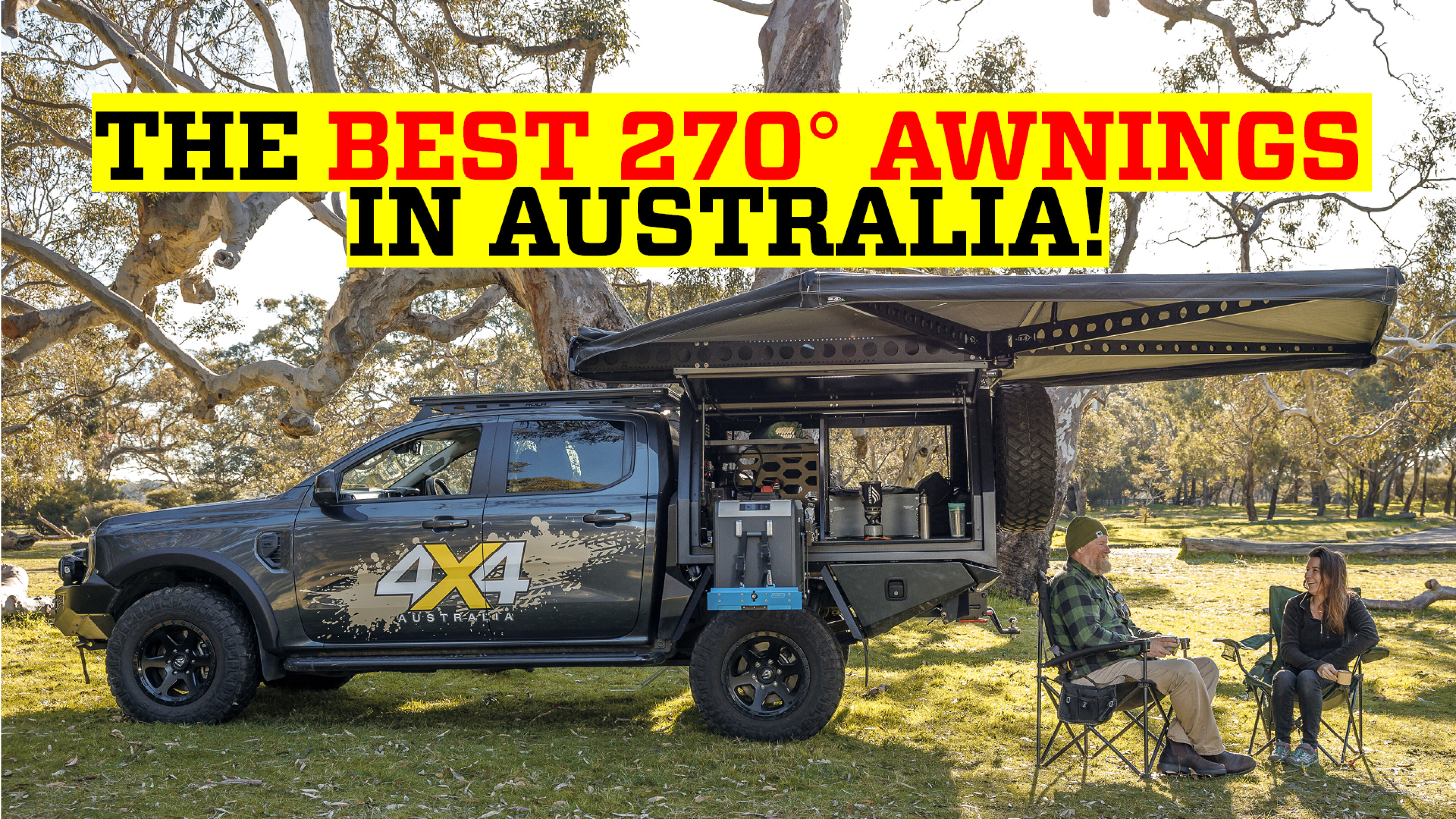
The evolution of the awning has been nothing short of extraordinary over the past decade.
In a few short years we have transitioned from using cheap tarps supported with tent poles and guy ropes, to dedicated fold-out and peg-down canvas products. Now, the 270-degree units seem to be all the rage. They offer a massive amount of shade and protection from the sun and rain, and yet somehow manage to fold away as quickly and easily (in most cases) as the standard awnings of yesteryear.
Constructed from lightweight materials such as aluminium - and with many examples using high-quality canvas - the majority of the current 270 awnings are built to last. So, if you’re looking to keep the rain off your swag next time the weather turns sour, then have a good read through this guide!
JUMP AHEAD
- Darche Eclipse
- Darche Kozi
- The Bush Company XT Max
- Eezi-Awn Bat
- Oztent Foxwing Series II
- Rhino-Rack Batwing
- Boss Aluminium
- Drifta Stockton
- 23Zero Falcon
Darche Eclipse 270 Gen 2
The most innovative thing about the Eclipse product is not just that it’s a top quality product, but it’s also very versatile.
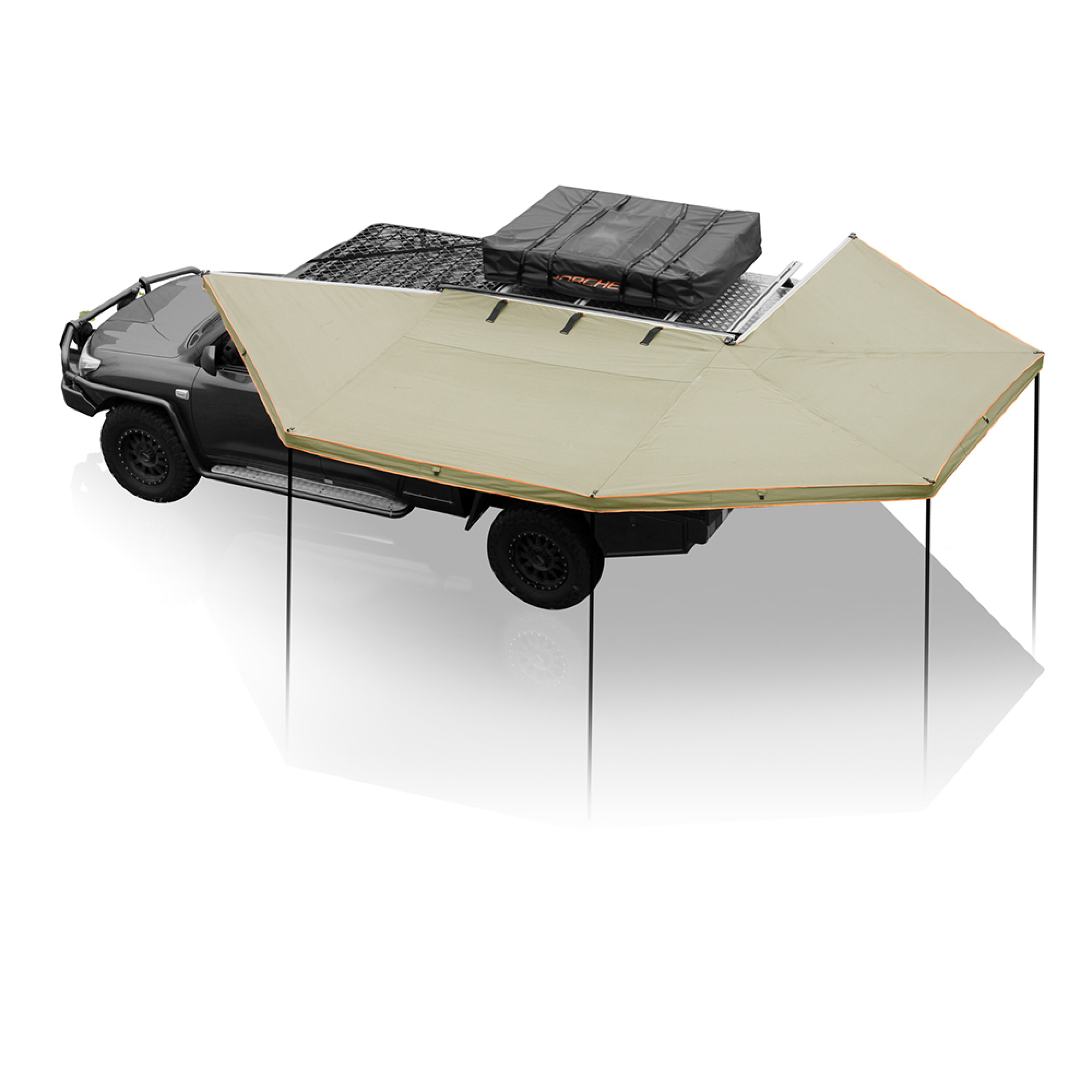
Designed for maximum shade and easy set-up and pack-down; it can be set up by one person. Hinged from both ends the Eclipse offers plenty of undercover area compared to other awnings on the market (approx. 11.5m2). However, with optional walls erected, up to 20.5 m2 of a sheltered area can be achieved. Each optional wall can be set up as a wind and weather break or as an upright awning extension, allowing the Eclipse to extend further up to 4.2 metres in total, featuring two pivoting alloy telescopic poles which are neatly stowed along the rafter when packing away.
Made from Darche’s proven and hard-wearing proofed polycotton ripstop canvas, a strong lightweight box tube alloy rafter system, and pivoting from heavy-duty steel and aluminium swivel hinge system, the Eclipse 270 is one of the most popular wrap-around awnings on our list, and for good reason.
| Coverage (m2) | 11.5 |
|---|---|
| Weight (kg) | 27.9 |
| Material | 320gsm polycotton grid ripstop canvas |
| Packed dimensions (mm) | 2200 (L) x 180 (W) x 200 (H) |
Pros
- Versatility
- Ease of set-up
- High quality
Cons
- Heavy
- Transport bags have been known to leak
- Not cheap
Darche Kozi 270
The Kozi range from Darche is built more for the budget-friendly end of the market.
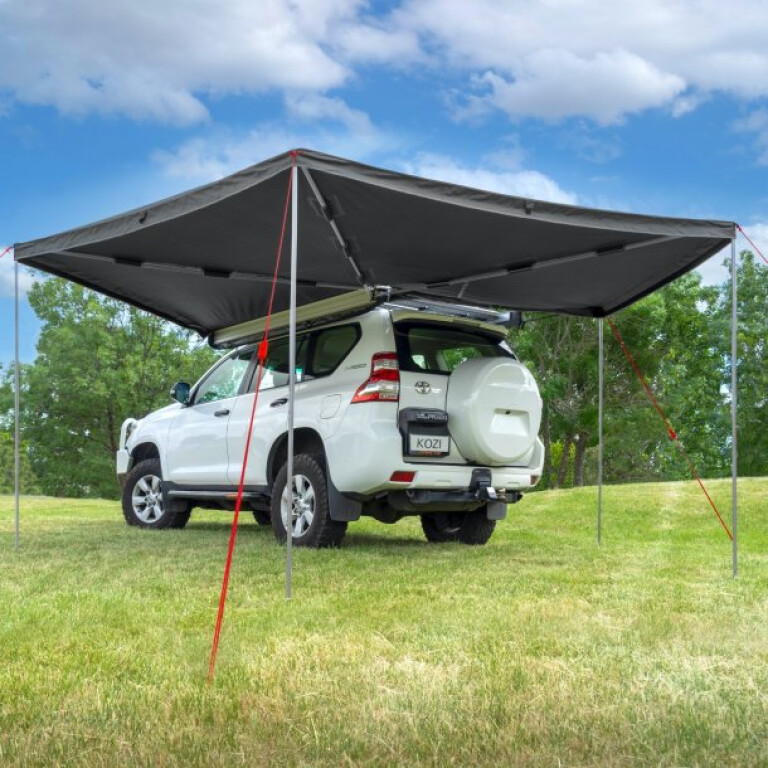
The Kozi 270 awning offers one of the best price points on our list. The ripstop canvas gives nearly 12m2 of coverage and a UPF50+ rating against the sun. Easy set-up for one person and aluminium pole construction makes this one of the best bang-for-buck 270 awnings on the market.
| Coverage (m2) | 11.8 |
|---|---|
| Weight (kg) | 20.2 |
| Material | 280gsm ripstop polycotton canvas PU-coated |
| Packed dimensions (mm) | 2700 (L) x 210 (W) x 150 (H) |
Pros
- Good coverage
- Value for money
- Lightweight
Cons
- Lower quality fabric than the Eclipse
- Lighter duty extrusions
- Lower waterhead rating
The Bush Company 270 XT Max
Looking for quality and durability at any price point? The Bush Company 270 XT Max needs to be on your shortlist.
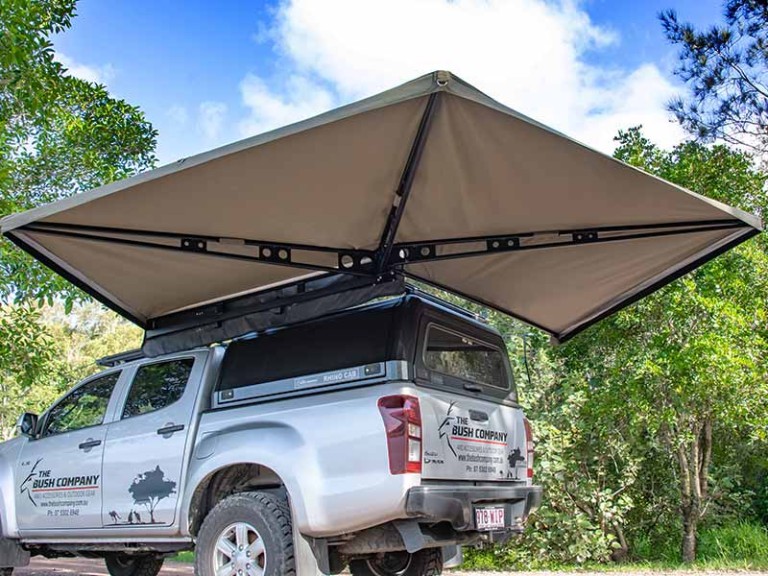
This innovative South African design features a solid 12m2 of coverage, a 60-second set-up time and a braced and gusseted extruded alloy composite construction, that’s paired with 316 marine-grade stainless steel hinges to provide enough strength for the swingin to be fully free-standing – no poles needed here. In extreme wind or rain there are guy ropes to secure the structure to the ground and guide water run-off.
The 270 XT Max features a 460gsm canvas travel bag, which The Bush Company says increases breathability and reduces the chance of mould and mildew; and the inside edge of the canvas has a 50mm-thick strip of Velcro for optional side wall attachment, so no more mucking around with zippers.
| Coverage (m2) | 12.0 |
|---|---|
| Weight (kg) | 33.5 |
| Material | 320gsm ripstop polycotton canvas |
| Packed dimensions (mm) | 2300 (L) x 210 (W) x 150 (H) |
Pros
- No need for poles
- Super high quality
- Can be mounted directly to rooftop tent
Cons
- Weight
- Price
- Diamond shape of awning can leave back door of wagons exposed
Eezi-Awn Bat 270
With approximately 10m2 of coverage available, the Eezi-Awn Bat is competitive on features but with a lower weight and price than many of the other offerings on the market.
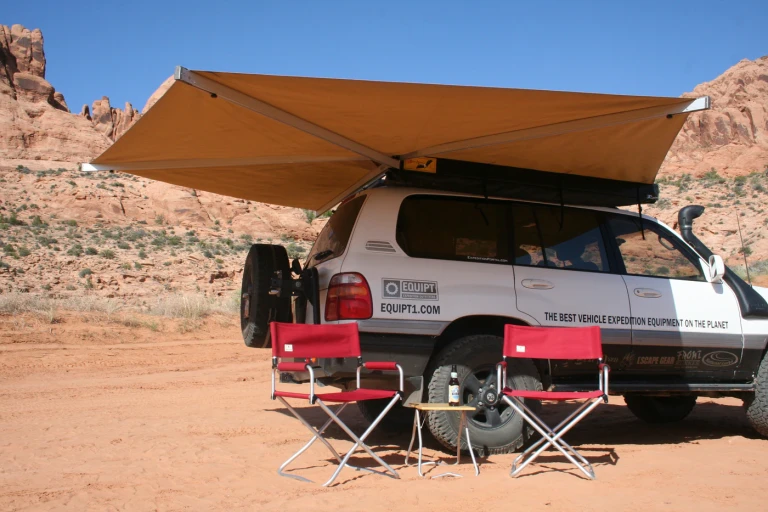
Aimed at the weekend warrior market, the Bat is constructed of aluminium and 280gsm ripstop canvas, and comes with built-in height adjustable legs. The key feature is the impressively compact design that has the legs built into the fold-out arms, making set-up and pack down a smooth and easy process that prevents damage to the legs in transit. When underway, the awning is zipped into a PVC case in less than a minute, ready for the next stop on your adventure.
| Coverage (m2) | 10.0 |
|---|---|
| Weight (kg) | 21.0 |
| Material | 280gsm ripstop canvas |
| Packed dimensions (mm) | 2300 (L) x 150 (W) x 130 (H) |
Pros
- Lightweight
- Value for money
- Quick and easy to set-up/pack away
Cons
- Older design
- Lower amount of coverage
- No warranty listed
Oztent Foxwing Series II
One of the original wraparound awnings, Oztent has updated its popular Foxwing awning with the Series II model.
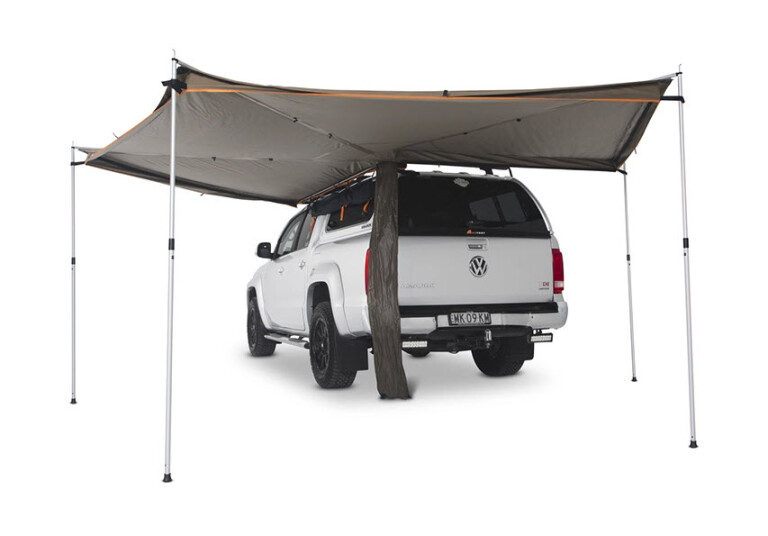
Along with a black travel colour and upgrade mounts, the Foxwing comes with a range of “why don’t they all do that?” clever safety features such as reflective guy ropes and a CPAI-84 fire resistance rating – so you don’t need to worry too much about the campfire proximity. One-person set-up and a continuous external skirting to provide effective protection against rain means that, even though it’s one of the older designs on our list, it’s still got a lot going for it.
| Coverage (m2) | 11.0 |
|---|---|
| Weight (kg) | 19.0 |
| Material | ModCan ripstop polyester |
| Packed dimensions (mm) | 2550 (L) x 90 (W) x 180(H) |
Pros
- Integrated toggles for LED lights
- Price
- CPAI-84 fire resistance
Cons
- Can be fiddly to set-up
- Older design
- Too long for some 4x4s
Rhino-Rack Batwing
Designed by roof-rack experts Rhino Rack to work with both its products and Thule roof racks, the Batwing has been designed from the ground up to offer premium coverage.
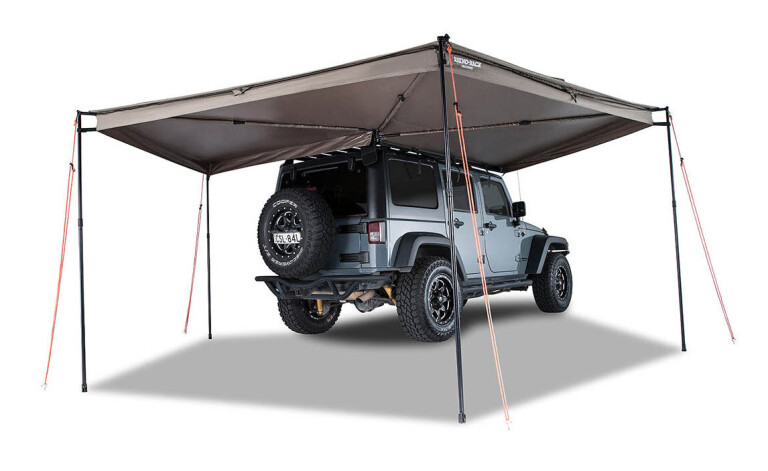
With a host of handy features such as rare earth magnets on the arms (to keep them in place) and a heavy-duty PVC travel bag with integrated pole and peg bag, the Batwing is a fantastic addition to any adventure vehicle. It will accept many accessories from older model awnings too, so there’s no need to re-buy products you may already own.
One of our favourite inclusions on this awning is the ability to pack the legs away either fully extended or at a pre-set length to suit the individual vehicle it’s mounted to, making set-up at your next location more convenient. Reliable and solidly built, the Batwing has a lot to offer the weekend traveller.
| Coverage (m2) | 11.0 |
|---|---|
| Weight (kg) | 21.5 |
| Material | 210D polycotton ripstop canvas |
| Packed dimensions (mm) | N/A |
Pros
- Earth magnet locking feature on arms
- Cancer Council endorsed
- Price
Cons
- Plastic hinges
- Longer set-up than freestanding awnings
- Must be pegged down for full functionality
Boss Aluminium 270
Boss Aluminium is more known for its tray and canopy designs rather than its awnings, but apparently the story goes that when the Boss team were looking to outfit their own vehicles, nothing they found stacked up so they decided to build their own – as you do.
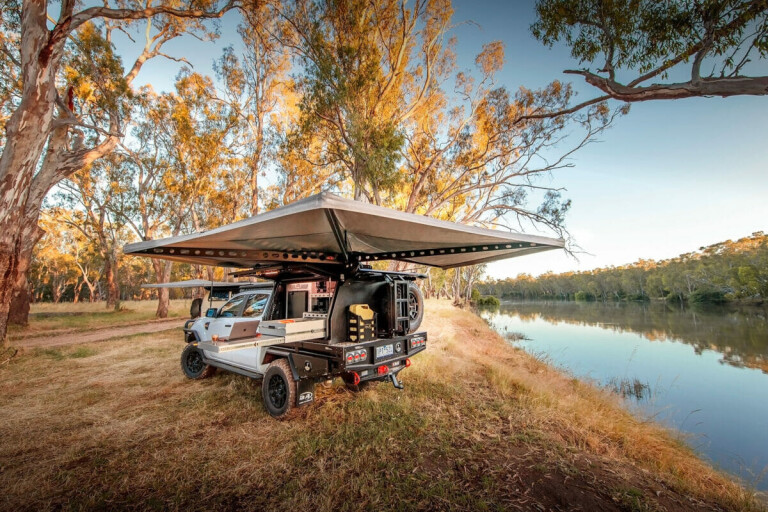
The result is a fully Australian-designed and -made awning that is strong enough – thanks to its ultra-beef arm design and reinforced tri-axis hinge – to not need any poles to keep it upright. Guy ropes can be attached in heavy weather, but for fair conditions it’s as quick and easy to set-up as it gets.
A host of well-thought-out inclusions for Aussie conditions include the central prop-arm that creates tension to allow water run-off, and the oversized canvas bag that more or less guarantees the awning will fit back inside. For a legitimate warranty-backed lifetime purchase, the Boss Aluminium 270 Awning is well worth a look.
| Coverage (m2) | 10.0 |
|---|---|
| Weight (kg) | 24.0 |
| Material | Wax Converters Coolabah T/S 304gsm dynaproofed canvas |
| Packed dimensions (mm) | N/A |
Pros
- Warranty
- Aussie-made
- Lightweight yet strong
Cons
- Price
- Coverage is a little less than others
Drifta Stockton
Another product that’s both lightweight and easy to use is from the team at Drifta, with the Stockton 270 awning.
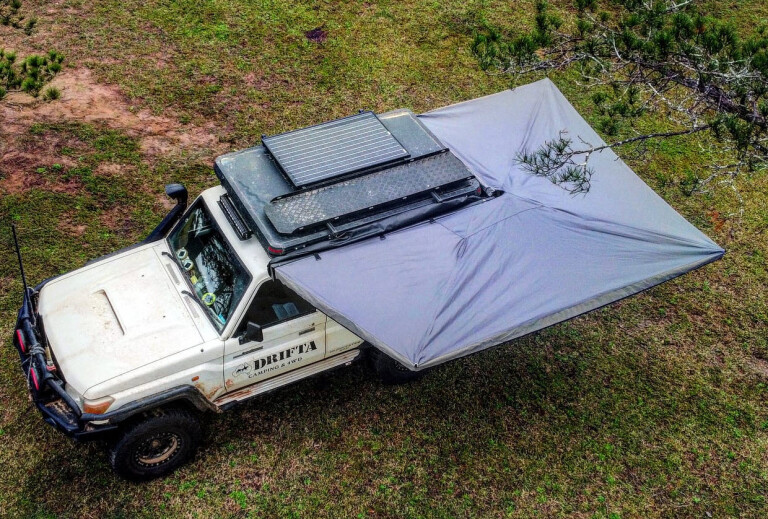
The awning is priced extremely well and offers a terrific amount of coverage considering how little material they use in the construction. Drifta is well known on the aftermarket scene for building tough, no-nonsense and easy-to-use products, and the Stockton 270 continues that tradition. If you want an awning that can handle both larger and weekend trips, then this could be the one for you.
| Coverage (m2) | 10.0 |
|---|---|
| Weight (kg) | 17.8 |
| Material | 600D Oxford ripstop polyester |
| Packed dimensions (mm) | 2400 (L) x 120 (W) x 160 (H) |
Pros
- Price
- Low weight
Cons
- Light duty
- Older design
- No warranty listed
23Zero Falcon 270
With its dual-hinge, two-pole design, the 23Zero Falcon opens up to a healthy 10m2 of coverage. When paired with the optional side walls, that figure balloons out to 25m2, which is enough to house a family of swags.
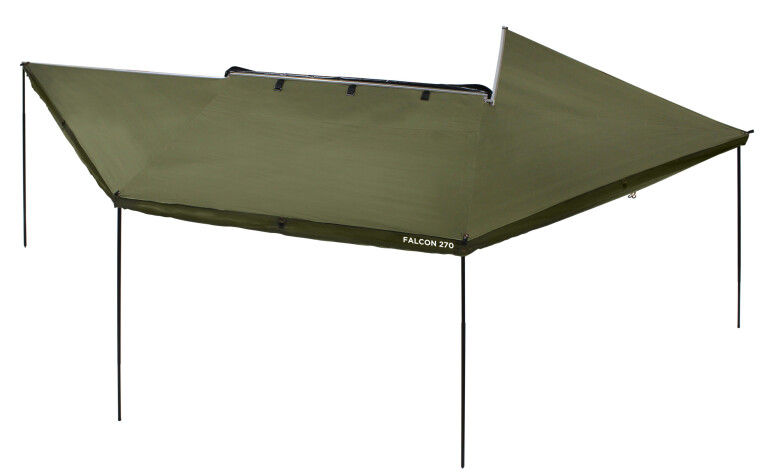
Constructed of extruded box aluminium rafters and cast aluminium hinges, the weight is kept surprisingly low, and set-up with one person is around the one-minute mark. The underside of the polycotton canvas is coated with 23Zero’s Light Suppression Technology (LST), which is a dark layer that effectively defuses sunlight and UV rays entering the shaded area – serving to keep you cooler in hot Australian conditions.
| Coverage (m2) | 10.0 |
|---|---|
| Weight (kg) | 19.0 |
| Material | 280gsm tear check canvas with LST coating |
| Packed dimensions (mm) | 2140 (L) x 160 (W) x 200 (H) |
Pros
- Easy to set up
- LST coating
- Lightweight
Cons
- Light duty extrusions
- Triangle rear section may not fully cover wagon doors
- Non-freestanding design
A buyers' guide to 4x4 awnings
Rain, hail or shine, you can’t beat vehicle-mounted awnings for the extra protection they provide at camp. The off-roader’s awning is a popular accessory for the four-wheeling community, and for good reason.
Not only do they provide valuable shelter from Australia’s unforgiving elements – heavy rain, strong wind and relentless sun – by adding walls and/or annexes, they create additional enclosed areas for punters to store equipment or to spend their time cooking and relaxing without being punished by flies, mosquitoes and the elements. Plus, they can be erected in the same amount of time it takes to pop open the fridge and crack the cap off your first coldy.
Not only does an awning provide timely shelter for a roadside cuppa or a quick snooze at camp, they can also prove invaluable if a vehicle breakdown occurs.
“There’s a reason why travellers are advised to stay with their vehicle when they break down in the outback, as exposure can be deadly,” said TJM’s James Jackson. “Anyone who has travelled in places like the Strzelecki or Simpson deserts knows that shade is hard to come by in these places, but if you have an awning you can create your own little oasis to have a cup of tea, make lunch or, in a worst-case scenario, wait for a good Samaritan in the case of a breakdown.”
While the idea of an awning may seem simple enough, it’s not an accessory you’ll want to skimp on when it’s time to swipe the credit card. There are many factors at play to ensure you get one that’ll stand up and protect when it’s needed most, and there’s no bigger challenge than the Aussie outback.
To dive deeper into the world of awnings, we spoke to a handful of industry experts from ARB, Alu-Cab/Ironman 4x4, TJM, and Darche.
Types of awnings
Side awnings are the most commonly used, mainly for their practicality and ease of operation. They’ll typically be mounted to the side section of a roof rack, providing ample sheltered space in the process.
Another option is a rear awning, which (quite obviously) is mounted to the rear of the vehicle’s roof rack/roof bars. Clearly, less space is afforded by mounting your awning to the rear. However, it’s quite common to see people with both side and rear awnings for an abundance of undercover capacity.
Instead of purchasing separate side and rear awnings, you could opt for a style called ‘270-degree awnings’. These differ from your ‘regular’ awnings by spanning out a full 270 degrees and providing plenty more sheltered space at both the side and rear of the vehicle. They typically unfold in much the same way as regular awnings, but they feature a hinge that allows the awning to unfold further. 180-degree awnings are another option that might better suit your set-up.
You can also opt for a retractable awning that utilises something like a spring-tensioned roller, which takes the manual work out of setting up and taking down.
Core components
When trawling aftermarket catalogues in pursuit of the perfect awning setup for you and your family, you’ll notice various sizes, configurations and designs – some with two poles, some with four; some with guy ropes, some without.
However, despite the differences in appearances, a quality-made awning will share the same core components. To ensure the awning will remain standing during high wind and heavy rain – and provide adequate UV protection and prevent water ingress – it’s important to ensure it has a selection of non-negotiable build features.
“Build construction is key,” advised TJM’s James Jackson. “An awning that is made well will set-up and pack away smoothly on the fifth or 500th time.
“Small details like the right-sized bag or case will make unzipping or zipping up simple; well-manufactured telescopic legs won’t get stuck when extending or collapsing; and overall build quality will mean the awning will stand strong in rough weather conditions, which is exactly when you want it to perform.”
It’s widely agreed that the best quality awnings are typically constructed using a polyester/cotton ripstop canvas, which is used for its high UPF50+ UV rating (the canvas in combination with the coating on the canvas provides the UPF50+ rating), overall durability, and its ability to prevent water ingress and withstand extreme conditions for prolonged periods.
“The thick ripstop canvas blocks the rays, and the materials are treated with PU (polyurethane) coating to stop (the rays) coming through,” advised ARB’s Shannon Alderwick. “Canvas is also a natural material for repellence and UV exposure.”
You’ll also be able to spot a sub-par awning courtesy of the quality of its stitching – if it’s badly stitched, steer clear.
In addition to the canvas material, it’s important to ensure the awning poles (and the pole joints and rivets) are built to a high standard, using quality material. Ideally, ensure the arms and joints are flexible, as they’re more prone to snap if they’re too rigid.
“Ironman 4x4 opt to use highly flexible plastic pole joiners which protect the awning in case of wind damage or squashing,” explained Hannah van der Sluys. “This is opposed to using aluminium pole joiners which can crack or bend out of shape.”
On this point, Shannon from ARB added that quality nylon joints are less likely to snap in high winds.
Other features to look for include extrusions that extend the full length; abrasion strips and pads; and additional accessories such as pegs and guy ropes. Most modern awnings will also feature embedded LED lighting strips, to ensure your camp setup kicks on long after the sun sets.
In addition to rigid/fixed joints and thin canvas, also avoid lightweight aluminium and extrusions, as this heightens the chance of failure down the track, and also check that the awning doesn’t hinder a rooftop tent from opening.
Wind resistance
An awning that will buckle at the first hint of a breeze is entirely useless for 4x4 travel. Experienced tourers will tell you how volatile the weather can be when exploring our vast continent, so it’s essential to have an awning that’ll survive strong winds, heavy rain and relentless sunshine.
“If the vehicle-mounting system is strong, the legs are made from strong materials and the design allows for flex in the joints – and you set up your awning correctly in terms of using guy ropes and setting your pole height – a high-quality awning can survive incredibly rough weather,” explained TJM’s James Jackson.
Ironman 4x4’s Hannah van der Sluys added: “Alu-Cabs’ 270-degree awning centre arm features an integrated drop-down pole that can be used to brace the awning for extra support. Additionally, each of the four awning arms boast a tie-down strap ideal for use in inclement weather conditions.”
An optional Alu-Cab Storm Kit is available, which offers additional anchorage and prevents rain water from pooling on the awnings canvas in extreme weather conditions.
Shannon Alderwick added that good guy ropes and pegs are invaluable assets to ensure your awning remains sturdy during windy conditions. “Use good guy ropes and pegs,” she said. “Don’t use steel pegs at the beach, purchase good quality sand pegs. And, if the wind is too strong, pull the awning down.”
Remember, it never hurts to smack additional pegs into terra firma for further support – plus, the use of guy ropes will keep your awning firmly planted in the soil. The weather can change quickly, so even if there’s not a breath of wind, it can change on a dime in the bush.
As Noel Anthony from Darche explained: “Always use guy ropes and poles, even in calm weather, and be prepared to pack away the awning if winds get too strong.”
Noel added that another handy tip to ensure the awning will survive strong winds is to park the vehicle so that the awning faces away from the prevailing wind rather than pointing into it.
Set-up and takedown
Once an awning is installed, typically to your roof-rack or roof-bar systems via supplied mounting brackets, to set up it’s simply a matter of rolling it out and unfolding the legs.
“Anyone who has done it once can set up a TJM awning in less than 30 seconds,” James Jackson advised.
Noel Anthony advised us that all Darche awnings come with instructions and can be set up by one person, and it should take no more than three minutes tops.
Setting up an ARB awning takes no longer, with Shannon Alderwick telling us that with a bit of practice, you will be set up in no time.
A great tip when it rains is to adjust one telescopic leg pole to be shorter than the other, so that the awning sits on an angle and the rain can more easily drain off. DARCHE awnings also feature gutter tubs, which is a useful addition to help with rain run-off.
When you’re ready to hit the road again, ensure the awning is rolled up tight and hugs the vehicle as tight as possible to ensure it doesn’t snag on branches when you’re out exploring.
After-sales support
As with any aftermarket purchase, it’s vital to ensure you purchase from a supplier that provides adequate after-sales support. Most of the reputable brands will offer substantial warranties for their products, and all of them will provide valuable assistance during your ownership of the awning.
How we review products
4X4 Australia has been reviewing four-wheel drive vehicles, aftermarket products and camping gear for more than 40 years. When looking for the best swags in Australia there are some things that are essential to ensure you sleep soundly under the stars.
When we compared each of the swags in the list with hundreds out there we looked at the size, weight, durability and price. We also searched for additional features that make these swags stand out from the rest.
We looked at hundreds of user reviews and drew on our own experience sleeping in swags to make sure our recommendations are for the best on the market.
Disclosure: When you buy through our links, we may earn a commission. We also include products that we do not earn a commission from.

COMMENTS